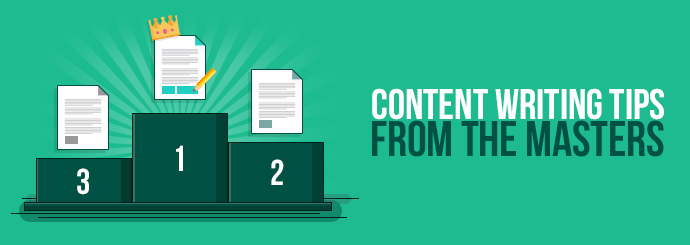According to WordPress statistics, over 70 million blog posts are produced each month on WordPress alone. Based on those gargantuan stats, it’s fair to say that competition is pretty high in the world of online content.
With so much content produced every single day, it’s all too easy for a mediocre blog to quickly become buried under the rubble – only the very best content can stay above ground.
That being said, there are a few simple rules that you can apply to your content in order to keep it unique and engaging. Check out these content writing tips from the masters...

Content Writing Tips from Literary Icons
When it comes to content writing advice, a simple Google search will fire back an endless list of results from a myriad of “experts” and “specialists”, usually accompanied by unfamiliar names and unrecognisable faces.
Why take the word of someone you’ve never heard of when you could sit under the learning tree of the biggest names in literary history?
Get the most out of your blog writing by channelling your inner Hemingway and following these steadfast tips from the very best.
Rules Are Made to be Broken
Elmore Leonard once quipped “If it sounds like writing, I rewrite it”. From a content standpoint, this can be an extremely valuable lesson to learn.
If strictly adhering to conventional writing techniques makes your content sound boring, don’t be afraid to bend the rules and play around with your wording.
Content that lacks natural flow can become laboured and quickly result in the reader navigating elsewhere. Let the content speak for itself: if you have to sacrifice writing technique for the purpose of rhythm and tone, so be it.
Keep in mind the audience that you’re writing for and mould your content accordingly. A conversational tone can be far more effective (and fitting) in a light-hearted blog than one that rigidly follows the codes and conventions of the Queen’s speech.
It’s worth remembering that this advice also comes from the same man who wrote “10 Rules of Writing” for The New York Times, proving that even the very best like to colour outside of the lines from time to time.
Don’t Be Too Wordy
In a 1906 letter to his eventual fiancé, Louie Burrows, D.H. Lawrence laid out some pearls of writing wisdom to his would-be lover after reading an essay of hers on the subject of art.
In the letter, Lawrence reminds Louie to “be careful of [her] adjectives”, reminding her that “there is so much more force in a rapid style”. Roughly translated in 21st-century lingo, what Mr Lawrence was so elegantly trying to say to his betrothed was simply this - “don’t waffle”.
If you too are guilty of waffling, Lawrence advises to “look at your piece and see how many three-lined sentences could be comfortably expressed in one line”. Remaining concise without losing the point is a key factor in maintaining reader retention.
Coincidentally, Lawrence also goes on to say in that very same letter “don’t use hackneyed adjectives” and instead to “try to be terse and in some measure original” – which brings us nicely to our next point…
Don’t Rely on Clichés
George Orwell once said, “Never use a figure of speech you are used to seeing in print”.
While Orwell may be best known for his novels and works of fiction, that piece of advice can just as easily be applied to anyone looking to create written content online.
In fact, Orwell’s rule is a fantastic tip for any writer looking to engage their audience in a unique and memorable way, while also providing a great opportunity to inject a bit of personality into your content.
Tired tropes and overused phrasing can become instant fodder for eye-rolling. Try to stray away from clichés and mix it up in order to keep your audience engaged and interested.
Enjoyable reading translates to longer page dwelling times which has a positive effect on SEO, as well as the user experience.
So, don’t be afraid to drop the clichés like a bad habit and avoid them like the plague.
…D’oh!
For more content writing tips or to explore the professional content creation services at Designer Websites, why not drop us a line today? Call now on 01446 339050 or get in touch online using the button below.
Contact Us